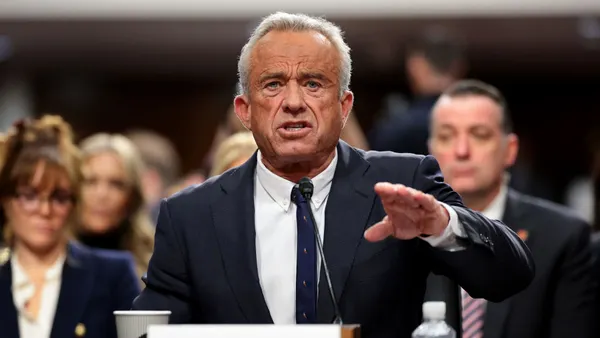The Food and Drug Administration has identified additional safety concerns associated with use of a drug used to treat a rare liver condition in the latest sign of trouble for a medicine once seen as a future blockbuster.
The agency on Thursday said it’s found cases of serious liver injury among patients with the rare disease primary biliary cholangitis and treated with a drug called Ocaliva, U.S. rights to which are currently owned by Italian pharmaceutical company Alfasigma. The findings were uncovered in a review of post-approval clinical trial data, and notably indicated these events occurred in patients who didn’t yet have cirrhosis, or scarring of the liver. The agency three years ago restricted use of Ocaliva in those who already have advanced cirrhosis.
According to the FDA, since curtailing Ocaliva’s use in 2021, the agency identified 20 more instances of liver transplants, listings for liver transplants, or liver-related deaths among people who received treatment. In its statement, the FDA cautioned that frequent liver test monitoring is “necessary” to catch a decline in organ function early in someone taking Ocaliva and to “ensure appropriate discontinuation” of treatment.
The regulator advised doctors to stop use if patients have any evidence of disease progression or if Ocaliva isn’t clearly effective. It will continue watching Ocaliva’s safety profile and follow up if new information arises.
The announcement is another setback for Ocaliva, a drug that was once among the most closely watched medicines in the biotechnology industry.
Known scientifically as obeticholic acid, Ocaliva was originally developed by biotech company Intercept Pharmaceuticals, which in 2016 secured for the drug the first FDA approval for PBC in two decades. Intercept had broader ambitions, aiming to make the drug the first available therapy for a far more common liver disease now known as metabolic dysfunction associated steatohepatitis, or MASH.
Early clinical data caused Intercept’s value to soar and made MASH, a leading cause of liver transplants, a top target for drugmakers. But further results made the drug’s benefits less clear, and safety risks — chiefly the potential for drug-induced injury — more apparent. The FDA twice, in 2020 and again in 2023, rejected Ocaliva’s use in MASH, forcing Intercept to lay off staff and abandon development. Intercept sold to Alfasigma months after the second rejection.
Since then, use of Ocaliva has been curtailed further. European regulators this year revoked its marketing authorization in the EU, where Ocaliva rights were owned by Advanz Pharma following a 2022 deal with Intercept. The FDA also declined to convert Ocaliva’s “accelerated” approval in 2016 into a standard clearance, though the agency still allowed the company to market the drug under its original OK.
New competitors have emerged, too, as the FDA approved Ipsen’s Iqirvo in June and Gilead Sciences’ Livdelzi two months later.
PBC is estimated to affect about 100,000 people in the U.S. The disease causes progressive organ damage and cirrhosis, and is often associated with severe itching and fatigue.















